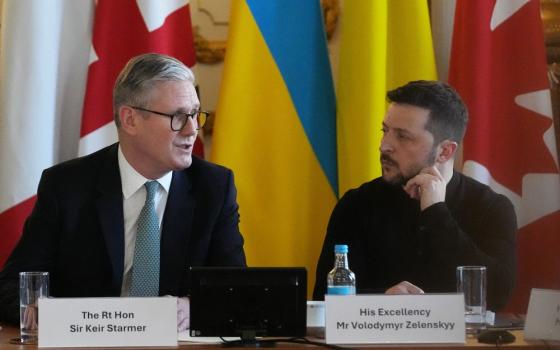The U.S. and the Holy See have signed a joint measure to reduce tax evasion by American individuals holding money at the so-called Vatican bank, in what officials said is the first such inter-governmental agreement between the country and the city-state.
Under the new measure, signed Wednesday by U.S. Ambassador Ken Hackett and Vatican Archbishop Paul Gallagher, the Holy See has agreed to automatically report information on Vatican bank accounts held by American citizens to the U.S. Treasury.
While neither U.S. nor Holy See officials would identify how many American individuals hold money at the Vatican, the number is assumed to be rather small, perhaps in the dozens.
Hackett, the American ambassador to the Holy See, told reporters at a briefing Wednesday morning that the move was “a type of stamp of approval” of the improvements the once scandal-plagued Vatican financial structure has made in recent years.
“This agreement, I think, is a step in the process,” said Hackett. “They have improved things.”
The new agreement obliges the Holy See to report information on U.S. citizens holding bank accounts with contents above a certain monetary threshold as stipulated under the Foreign Account Tax Compliance Act (FATCA), passed by the U.S. Congress in 2010.
Officials said the U.S. has signed such agreements with some 62 other countries and had reached “agreements in substance” with some 50 others.
While the U.S. and the Holy See have signed agreements in the past -- for example, to exchange information on financial crimes -- those agreements were signed between agencies and not between the two governments.
An inter-governmental agreement is considered a step below a formal treaty between governments and does not require U.S. Senate ratification.
Marji Christian, a political and economic officer at the U.S. Embassy to the Holy See, said the new agreement had been under discussion for about two years but would not comment on the substance of the discussions.
Part of the need for the lengthy time frame, Christian said, were the various changes Pope Francis has been instituting at the Vatican’s financial structures. For example, she said, the negotiations began prior to the creation in 2014 of the Vatican’s new Secretariat for the Economy.
Gallagher, the Vatican’s Secretary for the Relations with States at the Secretariat of State, called the agreement “unquestionably an historic event.”
“Signing the present agreement is … a further step in the Holy See’s long-term strategy to ensure and promote legality, transparency and ethical behavior in the economic and financial fields,” he said at remarks at the signing ceremony, according to a Vatican release.
Hackett told reporters the agreement “represents a proactive effort to model the highest levels of transparency.”
“This is a paradigm in a way,” he said. “The signing marks a very significant step for both the United States and the Holy See’s efforts to work collaboratively toward a global standard to combat off-shore tax evasion.”
Francis has been undertaking moves to reform Vatican financial structures, especially at the so-called Vatican Bank. Known formally as the Institute for the Works of Religion, it has been embroiled in the past in a number of high-profile scandals.
The pope instituted the new economy secretariat in 2014 to centralize authority over all financial matters and also created a separate Council for the Economy to oversee its work.
The pontiff has also appointed an auditor general for the Vatican for the first time, giving him supposedly complete freedom to review the finances of any Vatican department.
[Joshua J. McElwee is NCR Vatican correspondent. His email address is jmcelwee@ncronline.org. Follow him on Twitter: @joshjmac.]



